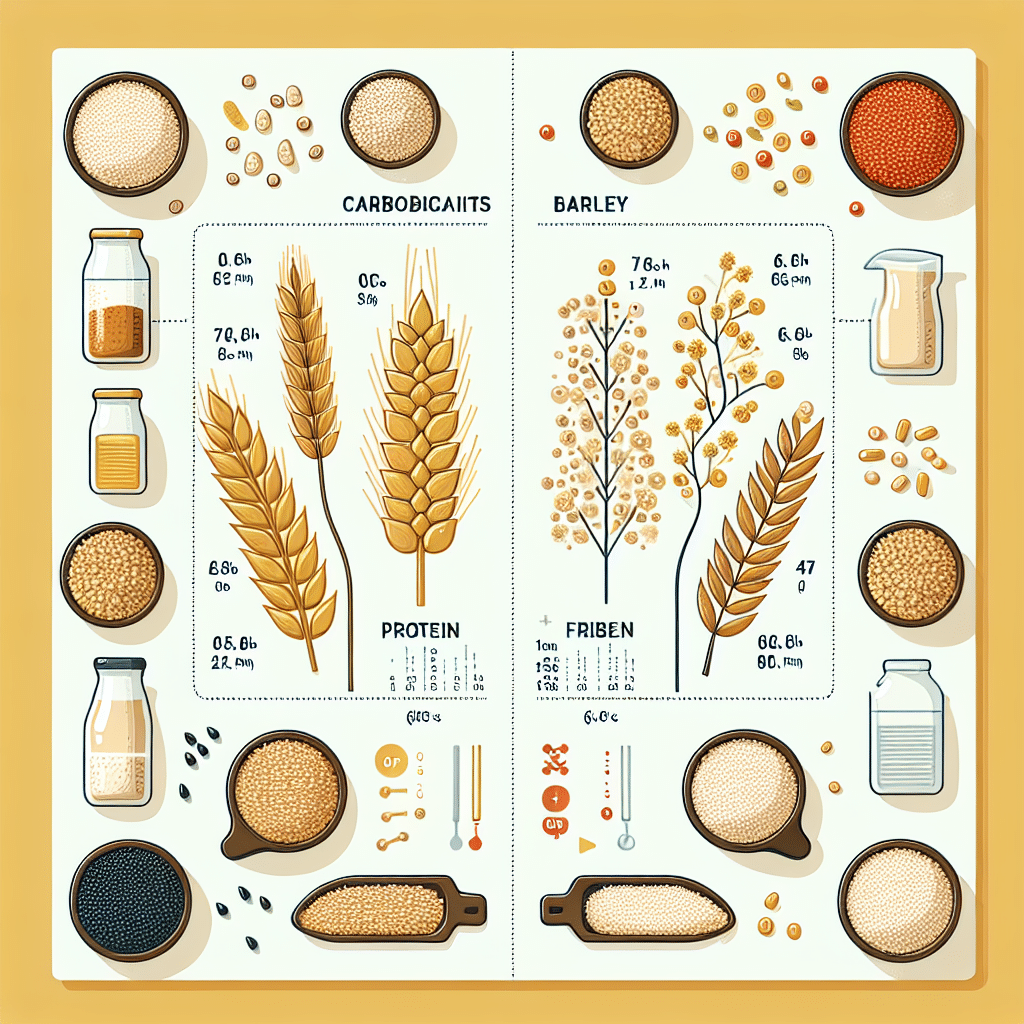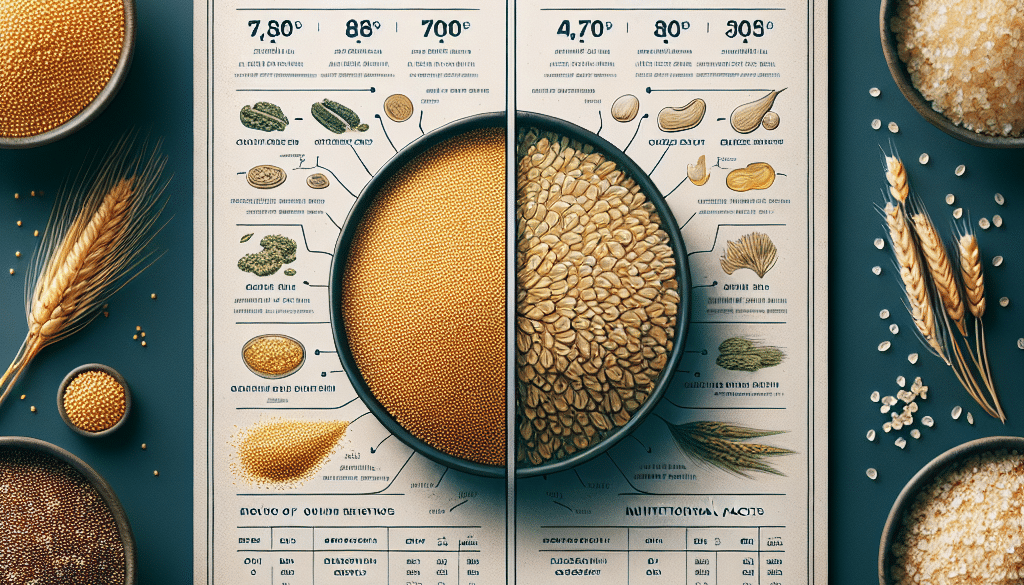Which Is Healthier Quinoa Or Barley?
-
Table of Contents
Quinoa vs Barley: A Comprehensive Health Comparison

When it comes to choosing healthy grains for our diet, the abundance of options can be overwhelming. Two grains that often come up in health-conscious discussions are quinoa and barley. Both have been staples in various cultures for centuries and offer unique health benefits. In this article, we will delve into the nutritional profiles of quinoa and barley, compare their health benefits, and determine which grain might be the healthier choice for your dietary needs.
Nutritional Profiles of Quinoa and Barley
Understanding the nutritional content of quinoa and barley is crucial to evaluating their health benefits. Here’s a breakdown of what each grain has to offer:
- Quinoa: Often referred to as a “superfood,” quinoa is a complete protein, meaning it contains all nine essential amino acids. It’s also high in fiber, iron, magnesium, phosphorus, manganese, and various B vitamins. Quinoa is gluten-free, making it a popular choice for those with celiac disease or gluten sensitivity.
- Barley: Barley is a rich source of dietary fiber, particularly beta-glucan, which is known for its cholesterol-lowering effects. It also provides a good amount of selenium, manganese, phosphorus, copper, and niacin. Barley contains gluten, so it is not suitable for those with celiac disease or gluten intolerance.
Health Benefits of Quinoa
Quinoa’s unique nutritional makeup translates into several health benefits:
- Complete Protein Source: Quinoa’s status as a complete protein makes it an excellent food choice for vegetarians and vegans who need to ensure they’re getting all essential amino acids.
- Rich in Fiber: The high fiber content in quinoa can aid in digestion, help control blood sugar levels, and contribute to a feeling of fullness, which can assist in weight management.
- Antioxidant-Rich: Quinoa contains flavonoids like quercetin and kaempferol, antioxidants that have been shown to have anti-inflammatory, anti-viral, and anti-cancer effects.
- Gluten-Free: For individuals with gluten-related disorders, quinoa provides a nutritious and versatile alternative to grains that contain gluten.
Health Benefits of Barley
Barley also boasts several health benefits, thanks to its rich nutrient profile:
- Heart Health: The beta-glucan fiber in barley has been shown to lower LDL cholesterol, potentially reducing the risk of heart disease.
- Digestive Health: Barley’s high fiber content promotes healthy bowel function and may help prevent certain digestive conditions.
- Blood Sugar Regulation: The soluble fiber in barley can help slow the absorption of sugar, aiding in blood sugar control, which is particularly beneficial for those with diabetes.
- Weight Management: Like quinoa, the fiber in barley can increase satiety, helping to control appetite and support weight loss efforts.
Comparing Quinoa and Barley
When deciding between quinoa and barley, consider the following factors:
- Dietary Restrictions: Quinoa is the clear winner for those requiring a gluten-free diet.
- Protein Needs: Quinoa provides a higher-quality protein with all essential amino acids, making it ideal for those with higher protein requirements.
- Fiber Content: Both grains are high in fiber, but barley has a slight edge, particularly in beta-glucan, which has specific benefits for heart health.
- Mineral Content: Quinoa generally has a more diverse range of minerals and vitamins.
- Antioxidant Levels: Quinoa contains higher levels of antioxidants compared to barley.
Practical Considerations in Diet
Aside from health benefits, practicality plays a role in choosing between quinoa and barley:
- Cooking Time: Quinoa cooks faster than barley, which can be a deciding factor for those with limited time.
- Versatility: Both grains are versatile, but quinoa’s neutral flavor and gluten-free nature might make it more adaptable to various recipes.
- Cost: Quinoa is often more expensive than barley, which may affect the decision for budget-conscious consumers.
Conclusion: Which Is Healthier?
In conclusion, both quinoa and barley have their own set of health benefits and can be part of a balanced diet. The choice between the two should be based on individual dietary needs, restrictions, and preferences. Quinoa is a better option for those looking for a gluten-free, complete protein source with higher antioxidant levels. Barley is an excellent choice for those focusing on heart health and blood sugar regulation. Ultimately, incorporating a variety of whole grains, including both quinoa and barley, is likely the best approach to achieve a nutrient-rich diet.
Enhance Your Diet with ETprotein’s Protein Products
If you’re looking to supplement your diet with high-quality protein sources, consider ETprotein’s range of organic bulk vegan proteins. Their products, including organic rice protein, pea protein, and various seed proteins, are non-GMO, allergen-free, and boast a neutral taste. ETprotein’s offerings are ideal for those seeking to enhance their nutritional intake with plant-based proteins that cater to a wide array of dietary needs.
About ETprotein:
ETprotein, a reputable protein and L-(+)-Ergothioneine (EGT) Chinese factory manufacturer and supplier, is renowned for producing, stocking, exporting, and delivering the highest quality organic bulk vegan proteins and L-(+)-Ergothioneine. They include Organic rice protein, clear rice protein, pea protein, clear pea protein, watermelon seed protein, pumpkin seed protein, sunflower seed protein, mung bean protein, peanut protein, and L-(+)-Ergothioneine EGT Pharmaceutical grade, L-(+)-Ergothioneine EGT food grade, L-(+)-Ergothioneine EGT cosmetic grade, L-(+)-Ergothioneine EGT reference grade and L-(+)-Ergothioneine EGT standard. Their offerings, characterized by a neutral taste, non-GMO, allergen-free attributes, with L-(+)-Ergothioneine purity over 98%, 99%, cater to a diverse range of industries. They serve nutraceutical, pharmaceutical, cosmeceutical, veterinary, as well as food and beverage finished product distributors, traders, and manufacturers across Europe, USA, Canada, Australia, Thailand, Japan, Korea, Brazil, and Chile, among others.
ETprotein specialization includes exporting and delivering tailor-made protein powder and finished nutritional supplements. Their extensive product range covers sectors like Food and Beverage, Sports Nutrition, Weight Management, Dietary Supplements, Health and Wellness Products, and Infant Formula, ensuring comprehensive solutions to meet all your protein needs.
As a trusted company by leading global food and beverage brands and Fortune 500 companies, ETprotein reinforces China’s reputation in the global arena. For more information or to sample their products, please contact them and email sales(at)ETprotein.com today.














